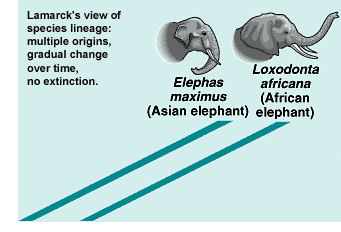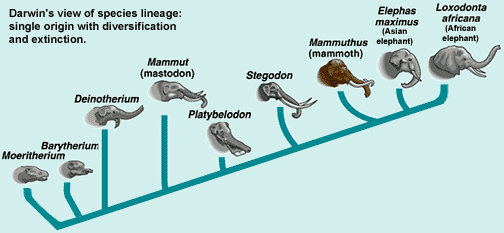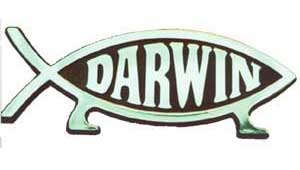| You studied various methods and types of evidence (e.g., geology, radiometric dating, fossils) used by scientists to develop an estimation of the age of the Earth and the age of prehistoric objects. You also learned that science is an ongoing process of inquiry and how to distinguish science from non-science. In today's assignment you will continue to develop your understanding of how science is conducted using a historical perspective. |
|
Prior to
today, you read three
excerpts from
original statements by individuals who contributed to a major
revolution in the history of biology. In the 1800s, each of these
individuals proposed an explanation for the changes that occur in
organisms over generations of time. Explanations for the origin
and diversity of life are not new.
 As
soon as humans began asking
questions about the natural world, it is likely that they wondered
about different forms of life around them. By the time of the
Greeks, explanations for life's origins and gradual changes had been
proposed by individuals such as Thales (624 to 528 B.C., photo to the
right) and
Anaximander (611 to 547 B.C., photo below). The changes that
occurred in
proposed explanations for changes in living organisms is an excellent
example As
soon as humans began asking
questions about the natural world, it is likely that they wondered
about different forms of life around them. By the time of the
Greeks, explanations for life's origins and gradual changes had been
proposed by individuals such as Thales (624 to 528 B.C., photo to the
right) and
Anaximander (611 to 547 B.C., photo below). The changes that
occurred in
proposed explanations for changes in living organisms is an excellent
example  of how scientific
knowledge evolves over time, usually building
on prior knowledge. The differing explanations for changes in
living organisms are also due, in part, to the influences of society,
culture, personal beliefs, and ways of viewing the world. of how scientific
knowledge evolves over time, usually building
on prior knowledge. The differing explanations for changes in
living organisms are also due, in part, to the influences of society,
culture, personal beliefs, and ways of viewing the world. Before you begin discussions of the excerpts you read, you will review various characteristics of science and your knowledge of the theory of evolution. As a class, briefly discuss the questions below:
|
Working in groups of four, discuss the excerpts you read. Begin with the statements by Jean Lamarck. Lamarck was a French biologist who proposed a new view of evolution in the early 19th century. Although Lamarck's views are not supported by scientists today, his ideas were of great importance historically because he questioned the then popular belief that species did not change over time. In your group answer the following questions:
|
|
Now focus on the excerpt by
Alfred Russel Wallace. Wallace was an English teacher in England
who also was interested in plant and animal life. While on
expeditions to the Amazon River in Brazil and the Malay Islands, he
asked questions about why different species occurred on different land
masses. If species, never change, then wouldn't you expect the
same species to occur on all of the Malay islands? In your group
answer the questions below. As you develop your answers, think of
ways in which the excerpt demonstrates science as a human endeavor and
the nature of science.
|
|
 |
 |
 |
|
  By
now, you probably realize that
your classmates have varying views about change in organisms over time
or
evolution. To gain some insight into why controversy about
evolution
exists in the United States, view video #7 by clicking on the icon
below. By
now, you probably realize that
your classmates have varying views about change in organisms over time
or
evolution. To gain some insight into why controversy about
evolution
exists in the United States, view video #7 by clicking on the icon
below. |
| ASSIGNMENT! Type
an essay (maximum of one
single-spaced page) on the nature of scientific knowledge as
demonstrated in the development of the theory of evolution. Your essay needs to clearly demonstrate your
understanding of the concepts of
adaptation, natural selection, and descent from common ancestors. |









